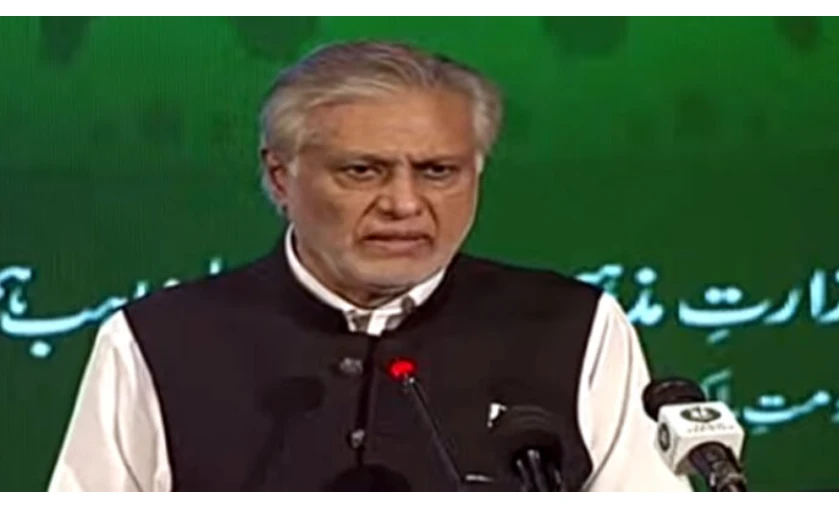Ishaq Dar says education reforms must be based on Seerat-un-Nabi

Stay tuned with 24 News HD Android App

Deputy Prime Minister and Foreign Minister Senator Ishaq Dar has emphasised the need to transform Pakistan’s education system, based on a multifaceted approach focusing on character building, technological integration, spiritual enrichment, and capacity building, reported 24NewsHD TV channel.
Addressing the Seerat-un-Nabi (PBUH) Conference held in connection with Eid Miladun Nabi, in Islamabad on Tuesday, Ishaq Dar said that education was not merely meant for material success but also for spiritual growth, welfare, and polishing capabilities to contribute to the welfare of the society.
Oraganised by the Ministry of Religious Affairs and Interfaith Harmony, the conference titled, “State Education System in Light of the Teachings of Holy Prophet (PBUH), was attended by Religious Affairs Minister Chaudhry Salik Hussain, besides hundreds of scholars from different schools of thought, diplomats, authors, and researchers.
The deputy prime minister said that Pakistan’s education system was facing numerous challenges and suggested the religious affairs minister to carry out the review and reforms in coordination with the education ministry in light of Islamic teachings and by incorporating the suggestions from religious scholars.
Highlighting the significance of education in Islam, he cited the first revealed Quranic verse translated as “Read, in the Name of your Lord Who created” and numerous ahadith of the Holy Prophet (PBUH) and said education played a significant role for the benefit of the humanity besides enabling the humans to distinguish between good and evil.
He said Islam had made it obligatory for everyone to seek knowledge and the state was responsible for providing resources.
Deputy Prime Minister Dar observed that following the influx of social media and other technological tools, society was faced with the dilution of morality in youth, and the Ulema should play their role in addressing the situation.
He said social justice was a significant component of the Islamic education system, therefore our education system should promote these values and students should be nurtured to become future leaders.
Dar also highlighted the division between religious and contemporary education systems in the country and also called for bridging the gap with modern technological education, besides emphasising the efforts to make Pakistan an economic power.
The deputy prime minister also distributed prizes among the best writers of books on the life and teachings of the Holy Prophet in different categories, as well as anthologies of Naats and those related to the conference theme.
In his address, Minister for Religious Affairs and Interfaith Harmony, Chaudhry Salik Hussain emphasized the importance of following the teachings of the Holy Prophet Muhammad (Peace Be Upon Him) to enlighten the daily lives and strengthen the moral fabric of society.
Salik, extending his heartfelt greetings to the nation and the distinguished guests on this auspicious day, noted that this year’s conference theme, “The Educational System of the State in Light of Seerat-un-Nabi (Peace Be Upon Him)”, highlights the Prophet’s exemplary leadership and governance, which transformed Madina into a welfare state based on education and wisdom.
Salik lauded the role of the Ulema and religious scholars in disseminating the teachings of the Prophet Muhammad (Peace Be Upon Him) and emphasized the critical need for an education system inspired by Islamic values that not only focuses on intellectual growth but also moral and spiritual development.
He recalled the Prophet’s (Peace Be Upon Him) first divine command, ‘Iqra’ (Read), underscoring the importance of knowledge as a foundation for human civilization and progress.
He further elaborated that the inclusion of ethical teachings, such as honesty, justice, and responsibility, into the educational curriculum is vital for fostering a balanced and well-rounded society.
Salik mentioned that the key point that shook the very roots of feudalism, inequality, and injustice is the fundamental right to education for all of humanity, without discrimination. He said the Holy Prophet (Peace Be Upon Him) advocated for every person’s right to acquire knowledge, whether male or female, regardless of race or social status.
Salik drew the attention of scholars to how the practical implementation of modern education systems is possible. In light of the teachings of the Holy Prophet (Peace Be Upon Him), how we can incorporate these principles into the contemporary educational framework, he added.
He said the curriculum should be designed to balance religious and worldly knowledge adding that subjects like science, mathematics, and history should be taught alongside the Quran, Hadith, and Fiqh to ensure a well-rounded education for students.
Additionally, Salik said the role of technology in the education system cannot be overlooked. He said the principles taught by the Prophet (Peace Be Upon Him), such as utilizing all available resources to acquire and disseminate knowledge, are still applicable today. Integrating technology into the education system can make knowledge more accessible and engaging, he maintained.
In his concluding remarks, Minister Salik called for the continuous promotion of the teachings of the Prophet (Peace Be Upon Him) and recognized the national consensus on the sanctity of the belief in the finality of Prophethood. He also praised the judiciary, particularly the Chief Justice of Pakistan, and prominent religious scholars like Mufti Taqi Usmani and Mufti Muneeb-ur-Rehman, for their contributions to upholding the nation’s religious values.
The Seerat-un-Nabi Conference is an annual event organized by the Ministry of Religious Affairs and Interfaith Harmony to encourage research and discussion on the various aspects of the life of the Holy Prophet (Peace Be Upon Him) and their application in modern times.
